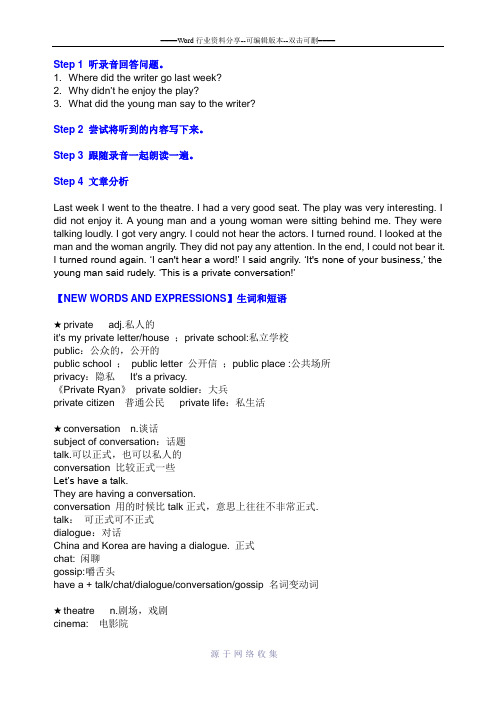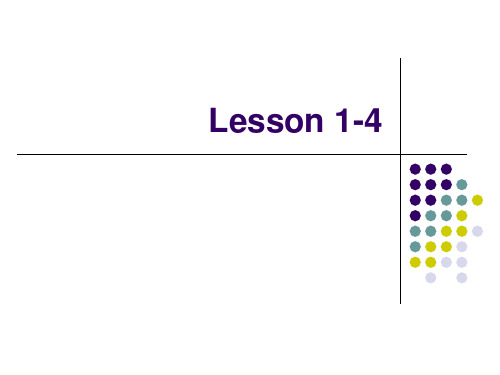新概念第二册第1课课件
新概念英语第二册第一课(包含课文、练习及答案)

新概念英语二 Lesson 1Lesson 1 A private conversation 私人谈话First listen and then answer the question. 听录音,然后回答以下问题。
Why did the writer complain to the people behind him?Last week I went to the theatre. I had a very good seat. The play was very interesting. I did not enjoy it. A young man and a young woman were sitting behind me. They were talking loudly. I got very angry. I could not hear the actors. I turned round. I looked at the man and the woman angrily. They did not pay any attention. In the end, I could not bear it. I turned round again. 'I can't hear a word!' I said angrily.‘It's none of your business,' the young man said rudely. ‘This is a private conversation!'New words and expressions 生词和短语private adj. 私人的 conversation n. 谈话theatre n. 剧场,戏院 seat n. 座位play n. 戏 loudly adv. 大声地angry adj. 生气的 angrily adv. 生气地attention n. 注意 actor. n男演员turn. vi 转身 bear(bore, borne) v. 容忍business n. 事 rudely adv. 无礼地,粗鲁地Note on the text 课文注释1 go to the theatre, 去看戏。
新概念英语第二册第一课

Attention
n. 注意
Attention, please. pay a little/some/more/no /close/great/enough attention pay attention to sth draw one’s attention That’s all, thank for your attention
6. He had a good seat. He was sitting in a good( ). A. chair b. place c. armchair d. class 7. He was a young man. He wasn’t very ( ) A. old b. big c. tall. d. large 8. The writer looked at the man and the woman angrily. He was very ( ) A. sad b. unhappy c. cross d. pleased 9. The writer could not bear it. He could not ( )it. A. carry b. suffer c. stand d. lift 10. The young man spoke rudely. He wasn’t very A. clever b. rude c. polite d. kind
Where there is a will, there is a way.
言归正传Get down to business
Lesson 1
A
private conversation
新概念英语第二册第一课最全讲义

Step 1 听录音回答问题。
1. Where did the writer go last week?2. Why didn’t he enjoy the play?3. What did the young man say to the writer?Step 2 尝试将听到的内容写下来。
Step 3 跟随录音一起朗读一遍。
Step 4 文章分析Last week I went to the theatre. I had a very good seat. The play was very interesting. I did not enjoy it. A young man and a young woman were sitting behind me. They were talking loudly. I got very angry. I could not hear the actors. I turned round. I looked at the man and the woman angrily. They did not pay any attention. In the end, I could not bear it.I turned round again. ‘I can't hear a word!’ I said angrily. ‘It's none of your business,’ the young man said rudely. ‘This is a private conversation!’【NEW WORDS AND EXPRESSIONS】生词和短语★private adj.私人的it's my private letter/house ;private school:私立学校public:公众的,公开的public school ;public letter 公开信;public place :公共场所privacy:隐私It's a privacy.《Private Ryan》private soldier:大兵private citizen 普通公民private life:私生活★conversation n.谈话subject of conversation:话题talk.可以正式,也可以私人的conversation 比较正式一些Let’s have a talk.They are having a conversation.conversation 用的时候比talk正式,意思上往往不非常正式.talk:可正式可不正式dialogue:对话China and Korea are having a dialogue. 正式chat: 闲聊gossip:嚼舌头have a + talk/chat/dialogue/conversation/gossip 名词变动词★theatre n.剧场,戏剧cinema: 电影院★seat n.座位have a good seat(place)take a seat : 座下来,就座take your seat/take a seatIs the seat taken? 这个座位有人吗?no/yessit Sit down ,pleaseseat Take your seat, please.Be seated, please 更为礼貌seat是及物动词,后面有宾语sit是不及物动词,后面不加宾语seat后面会加人; seat sb; seat him; seat:让某人就座sit he is sitting there.you seat him;〖语法精粹〗When all those present__, he began his lecture.A. sitB. seatC. seatedD. were seatedsit, sit down; seat, be seated; take a seat★play n.戏★loudly adv. 大声的★angry adj. 生气的cross=angry ; I was angry. He was cross.Don't get cross with me, it wasn't my fault.不要对我生气,那不是我的错。
新概念英语第二册 第一课- 第四课

★angry adj. 生气的 ★angrily adv. 生气的 angry =cross I was angry. /He was cross. annoyed: 恼火的; be blue in the face 脸上突然变色 程 I was annoyed. 度 I was angry/cross. 加 I was very angry. 深 I am blue in the face.
11 The writer could not bear it. He could
not __C____ it.
a. carry
b. suffer
c. stand
d. lift
bear 忍受=stand suffer 遭受,忍受 (精神或肉体上)痛苦, suffer后面必须加一种痛苦 I suffer the headache.(肉体上的痛苦) He often suffers defeat.(精神上的痛苦)
Lesson 1-4
Lesson 1 A private conversation
★private adj.私人的 ① adj. 私人的 private life 私生活 private school 私立学校 It's my private letter. It's my private house. ② adj. 普通的 private citizen 普通公民 我是一名公民。
6、In the end, I could not bear it.
in the end :最后,终于,表示一段较长的 时间之后或某种努力之后 她努力独立完成作业。但最后她还是让她 弟弟帮了忙。 She tried hard to finish her homework by herself. In the end, she had to ask her brother for help.
新概念二第一课课件Lesson 1 A private conversation

4. seat n.座位 v.安排坐下,使就坐 have a seat/take a seat 就座 (比sit down更有礼貌) have a good seat 有一个好位置 辨析:seat/sit seat只做及物动词,sit可做及物动词也可做 不及物动词 be seated 坐着,坐下;位于
新概念英语 二
welcome
主讲老师:Arthur
新概念英语二
新概念英语第二册共计96课,分4个单元(每24课一 个单元)前两个单元是对新一语法的操练和重现;第三 个单元较难,是一些复合句,第四个单元为复习单元, 每单元有一个综合考试。 新二是我们学习英语的一个过渡,同时也是一个转变。 从一个会说日常英语的人转变成一个敢动笔进行基本写 作的人。以96篇小故事为素材,培养学生听、说、读、 写的基本能力,其优势在于扩充词汇、统揽语法、集合 实践、听说兼修。在掌握第一册基本语法的基础上,由 浅入深逐步讲解语法要点,使学习者轻松掌握枯燥的语 法;通过对句型结构的分析及对短语用法的讲解,使学 习者在真正的听说读写中运用地道的句型。
问题是你想要做什么
二、主语———动词 在这一句型中,动词为不及 物动词及不及物的动词词组。在有的句子中,不 及物动词可以有状语修饰。 1.The sun is rising. 2.I'll try. 3.Did you sleep well?(well做状语,修饰不及物 动词sleep) 4.The engine broke down. 注意:在此句型中, 有少数不及物动词表达被动含义,表达主语本身 所具有的特性,不用被动语态。 1.The book sells well. 2.The window won't shut. 3.The pen writes smoothly.
新概念第二册第1课

They did not pay any attention.
= They paid no attention.不注意 pay attention注意 Pay attention to sth对...注意 eg.Please pay attention to the notes. Attention,please.请注意。
I turn round.
I turn round = I turned around. 3)翻身 turn over eg. I couldn’t fall asleep; I just turned over and over and over. 4)变得(多指颜色的变 化)系动词=get eg. Leaves turn yellow in the fall. eg. His face turned red with anger.
பைடு நூலகம்
A young man and a young woman were sitting behind me.
Were sitting 过去进行时
现在进行时 强调目前或现阶段正在做某事。
过去进行时 描述的是过去某时正在做某事。 通常用过去进行时描述背景,然后用一般过去式引 出故事的情节。
They were talking loudly. I got very angry.
I turned round again. ‘I can’t hear a word!’ I said angrily.
Word
have a word with sb 跟某人说一句话 have words with sb 跟某人吵架
‘It’s none of your business,’ the young man said rudely. ‘ This is a private conversation.’
新概念英语第二册Lesson1课件
I could not hear the actors.
Key structures and usage
过去进行时:过去某个时间正在进行 或发生的动作 A young and a young woman were sitting behind me.
They were talking loudly.
• • • • • • • • • • • • • • •
【Key structures】 简单陈述句的语序 陈述句一定是有主语,有动词,有宾语,有句号 6 1 2 3 4 5 6 when? Who? Action Who? How? Where? When? Which? Which? What? What? 1 ---主语,一般由名词、代词或名词短语构成,通常位于动词之前,动词必 须与主语一致,即主语决定动词的单复数形式 2 ---谓语,由动词充当 3 ---宾语,一般为名词、代词或名词短语 4 ---副词或介词短语,对方式或状态提问,往往做状语 I like her very much 5 ---地点状语,一般在方式副词之后,时间副词之前 6 ---时间状语,可以放在句首或句末 简单陈述句一定不能少的是主语, 谓语. 如果问何时何地,是一个固定搭配 when and where
• • • • • •
★business n. 事, 生意 ① n. 生意 business man :生意人 do business: 做生意 ② n. 某人自己的私人的事情 It's my business. (指私人的事, 自己处理的 事) • It's none of your business. 不关你的事。
Language points
以下短语中名词前不加冠词:
新概念英语第二册第1课
enjoy +doing/sth
句型分析: 4. A young man and a young woman were sitting behind me.They were talking loudly. 析: 过去进行时 结构:was/were+动ing 现在进行时:am/is/are+动ing
8. bear v.(bore /borne)容忍 承受 负担 n.熊 例:我无法容忍他的爆脾气。 I can ’t bear his hot temper. 辨析:bear/stand /put up with bear/stand忍受,遭受,前者语气 较轻,二者常混用 put up with 忍受,容忍(常用于 口语中)
三、主语———动词———宾语 在此句型中,动词 为及物动词,划线部分为宾语。 1.Do you know these people(them)?(名词或代词 做宾语) 2.I can't express myself in English.(反身代词做宾语) 3.He smiled a strange smile.(同源宾语) 4.We can't afford to pay such a price.(不定式做宾语) 5.Would you mind waiting a few minutes?(动名词 做宾语) 6.I hope that I have said nothing to pain you.(从句 做宾语,即:宾语从句) 注意:并不是所有的及物 动词都可以接上述各种情况做宾语,不同的动词 有不同的用法,所以,在学习动词时,一定要掌 握其用法。
5.What do you want me to do?(不定式做宾补) 6.We thought him to be an honest man.(to be 做宾补) 7.He believed them to have discussed the problem.(不定式的完成式做宾补) 8.He believed her to be telling the truth.(不定 式的进行式做宾补) 9.Did you notice him come in?(不带to的不定 式做宾补) 10.I saw her chatting with Nancy.(现在分词做 宾补) 11.He watched the piano carried upstairs.(过
新概念英语第二册第一课(包含课文、练习及答案)
新概念英语二 Lesson 1Lesson 1 A private conversation 私人谈话First listen and then answer the question. 听录音,然后回答以下问题。
Why did the writer complain to the people behind him?Last week I went to the theatre. I had a very good seat. The play was very interesting. I did not enjoy it. A young man and a young woman were sitting behind me. They were talking loudly. I got very angry. I could not hear the actors. I turned round. I looked at the man and the woman angrily. They did not pay any attention. In the end, I could not bear it. I turned round again. 'I can't hear a word!' I said angrily.‘It's none of your business,' the young man said rudely. ‘This is a private conversation!'New words and expressions 生词和短语private adj. 私人的 conversation n. 谈话theatre n. 剧场,戏院 seat n. 座位play n. 戏 loudly adv. 大声地angry adj. 生气的 angrily adv. 生气地attention n. 注意 actor. n男演员turn. vi 转身 bear(bore, borne) v. 容忍business n. 事 rudely adv. 无礼地,粗鲁地Note on the text 课文注释1 go to the theatre, 去看戏。
新概念英语第二册-第一课
5. _W__a_s_____ (be) it cold in your city
yesterday?
过去进行时
表示在过去某一时刻或某一段时间
内正在进行或发生的动作。
1.构成 : “主语+was/were + 现在分词” 2. 否定形式: “主语+was/were not +现在分词” 3. 疑问句形式: “was/were + 主语+ 现在分词”
He went to the theater. 2. Why did the writer complain
(抱怨)to the people behind
him?
Because they were talking loudly.
Turn to P15 两道选择理解题
讲解课文 P15 句型和词汇选择题
陈述句:陈述一个事实,句末用句 号,分为肯定句和否定句。
简单陈述句:陈述一个事实的简单 句
主语+谓语动词+宾语+ 状语(时间/地点/方式)
时间状语即可以放在句首 也可以放句尾
汉语的语序: 什么人+什么时间+什么地点+怎样做+为什么做+做什么
我爸爸今天早上在家里很认真地为我做了一个汽车模型。
英语的语序: 什么人+做什么+为什么做+怎样做+什么地点+什么时间
My father made a car model for me carefully at home this morning.
做P14 B 句子排序 做P15最下面 句子排序
Grammar: 一般过去时
- 1、下载文档前请自行甄别文档内容的完整性,平台不提供额外的编辑、内容补充、找答案等附加服务。
- 2、"仅部分预览"的文档,不可在线预览部分如存在完整性等问题,可反馈申请退款(可完整预览的文档不适用该条件!)。
- 3、如文档侵犯您的权益,请联系客服反馈,我们会尽快为您处理(人工客服工作时间:9:00-18:30)。
adj. + ly变成adv.: loud + ly 变为loudly大声地 rude + ly 变为 rudely粗鲁地 beautiful + ly 变为beautifully美丽地
angry
[经典用法]
be angry with sb
生某人的气
theatre
[写法区别] tre为英式写法,ter为美式写法: theatre , theater 剧院 metre , meter 米 centre , center 中心 [经典用法] go to the theater 去看戏
seat
[作n.] take a seat占一个座位,坐下 have a seat 有一个座位 Miss , is this seat taken? [作v.] seat 和 sit 的真正区别: sit vi.后不可直接加宾语 Sit down , please. 请坐下。
It turned out that she didn„t get the job.
I looked the man and the women angrily
Angrily adv.
生气的
They did not pay any attention .
Pay attention to
1 pay attention to sth /doing sth 例:You must pay attention to your study. 你必须专心学习。
[比较学习]
notice
不用心去看 attention 用心去盯着 [口语应用] Attention, please! 请大家注意! Attention! 立正! At ease! 放松!
bear
[作n.] 熊 polar bear 北极熊 koala 考拉 grizzly 灰熊 [作v.] 同义词: bear, stand
be angry at / about sth 为某事而生气
[扩充学习]
cross
生气的 angry 生气的 (英式) mad 气的发疯 (美式) be blue in the face 气得发紫
attention
[经典用法] pay attention to sb/sth
2 get+done变成某种状态(get是连系动词) Don't get caught in the rain.别遭雨淋了。
Angry angrily
I could not hear the actors .
I turn round .
也可用turn around
turn out 证明是,结果是
TEXT
Last week I went to the theatre . I had a very good seat. The play was very interesting .I did not to enjoy it. A young man and young woman were sitting behind me .they were talking loudly .I got very angry .i could not hear the actors .I returned round .I look at the man and the woman angrily .they did not pay any attention .In the end ,I could not bear it . I turned around. I can‟t hear a word! I said angrily. It‟s none of your business ,the young man said rudely .This is a private conversation.
play
[作n.]
孩子们玩耍,游戏,玩
playfellow 游戏伙伴
playground 运动场
playboy 花花公子
[作v.] play后接“球类”: play basketball/football打篮球, 踢
足球 play chess下国际象棋 play 后必须接定冠词the 再加 “乐器”: play the violin拉小提琴, play the fife吹笛子
忍受 My sister can not bear mouse in the house. 屋子里有耗子,我姐姐可无法忍受。 endure 忍受 Talent is enduring patience. 天才就是持续不断地忍耐。
business
[作n.]
事情 thing 泛指事情 matter 一般指麻烦的事情 What‟s the matter? business 私人事情 It„s none of my business. affair 事务、事件(较正式) international affairs, love affairs
请坐,比sit down 更有礼貌
seat
The play was very interesting .
Play
戏
I did not enjoy it .
enjoy
1.表示“喜欢”“享受”等, 其后可接动名词作宾语 Children enjoy reading stories 2. 其后接反身代词,表示“过得快活”, Enjoy oneself =have a good time
text
exercise
Words& expression
goals
Key structures
notes
Summary writing
1.Where did the writer go last week? 2. Why didn‟t he enjoy the play? 3. What did the young man say to the writer?
conversation
[经典用法] have a conversation with
sb I had a long conversation with my father yesterday afternoon. have a conversation about sth Shall we have a conversation about your vacation ?
[重要词组] in private/public
译:我可以私下同你谈谈吗?
Can I speak to you in private? [同义词] personal 个人的 PS: Personal Statement 个人陈述 PA: Personal Assistant 个人助理
A young man and a young woman were sitting behind me .
behind
They were talking loudly.
loudly
I got very angry.
1 get+adj. (get是连系动词) In summer it doesn't get dark until after eight o'clock. 夏天,直到八点过后,天色才暗下来。
[作n.]
生意、出差 do business with sb 和某人做生意 Business is business. 公事公办 on business 出差 “Bill, would you come to Peking university ?” “Sorry, I can‟t. I‟m on business in Shanghai now.”
让我们成为好朋友
What’s your name? Which school are you from? What grade are you in? Do you like English? Why? What’s your hobby(兴趣爱好)?
What do I like doing in my spare time?
3.put up with …常用
语口语
‘I can’t hear a word !’ I said angrily
It‟s none of your business .
none of your business
不管你的事
None 是不定代词,意思是‘无人,无物 (表三者或三者以上) None of the money was wasted .
Sit on the chair. 请坐在椅子上。
seat vt.后可直接加宾语 常见形式为sb be seated. 实践练习题: When all those present_____ ,
he began his lecture. A.sit B. set C. seated D. were seated 答案为:D
2 pay attention+从句 例:Please pay attention to what I am saying. 请注意我说的话.
I could not bear it .
bear
e.g. I can‟t bear the pain.
1.Stand 常用于否定 2. Tolerate +v.ing /n.
New words and expression
private
[作adj.] 私人的
private letter 私人信件,
private school私立学校,
private company 私人公司
